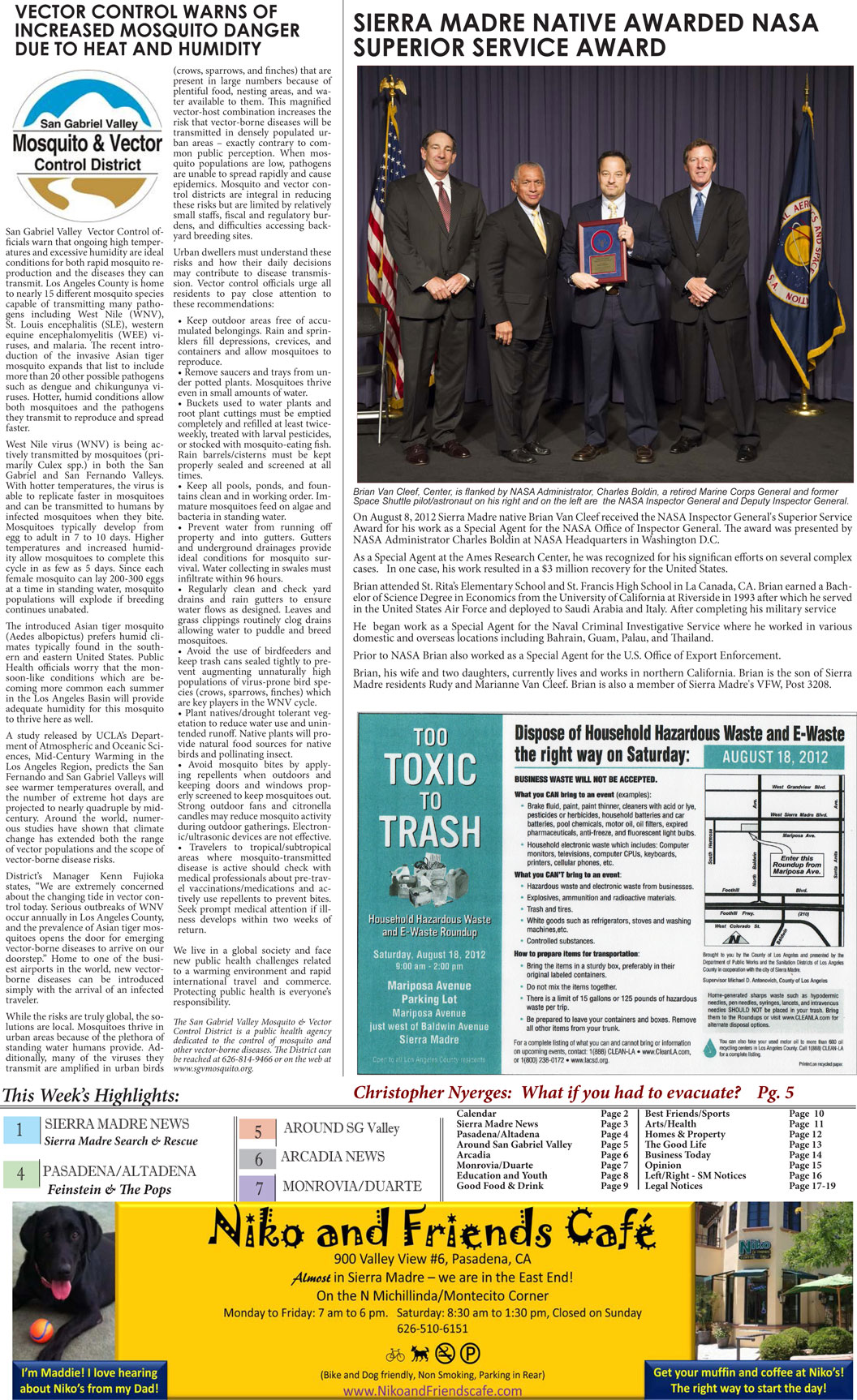|
| ||||||||||||||||||||
| ||||||||||||||||||||
| Inside
this Week: Calendar: Sierra Madre: Pasadena – Altadena: The SGV / The World: Arcadia: Monrovia – Duarte: Education & Youth: Good Food & Drink: Best Friends / Sports: Arts / Health: The Good Life: Business News & Trends: Opinion: Left Turn / Right Turn: Columnists: Recent
Issues: |
VOLUME 6 NO 33 SATURDAY AUGUST 18, 2012 San Gabriel Valley Vector Control officials warn that ongoing high temperatures and excessive humidity are ideal conditions for both rapid mosquito reproduction and the diseases they can transmit. Los Angeles County is home to nearly 15 different mosquito species capable of transmitting many pathogens including West Nile (WNV), St. Louis encephalitis (SLE), western equine encephalomyelitis (WEE) viruses, and malaria. The recent introduction of the invasive Asian tiger mosquito expands that list to include more than 20 other possible pathogens such as dengue and chikungunya viruses. Hotter, humid conditions allow both mosquitoes and the pathogens they transmit to reproduce and spread faster. West Nile virus (WNV) is being actively transmitted by mosquitoes (primarily Culex spp.) in both the San Gabriel and San Fernando Valleys. With hotter temperatures, the virus is able to replicate faster in mosquitoes and can be transmitted to humans by infected mosquitoes when they bite. Mosquitoes typically develop from egg to adult in 7 to 10 days. Higher temperatures and increased humidity allow mosquitoes to complete this cycle in as few as 5 days. Since each female mosquito can lay 200-300 eggs at a time in standing water, mosquito populations will explode if breeding continues unabated. The introduced Asian tiger mosquito (Aedes albopictus) prefers humid climates typically found in the southern and eastern United States. Public Health officials worry that the monsoon- like conditions which are becoming more common each summer in the Los Angeles Basin will provide adequate humidity for this mosquito to thrive here as well. A study released by UCLA’s Department of Atmospheric and Oceanic Sciences, Mid-Century Warming in the Los Angeles Region, predicts the San Fernando and San Gabriel Valleys will see warmer temperatures overall, and the number of extreme hot days are projected to nearly quadruple by mid- century. Around the world, numerous studies have shown that climate change has extended both the range of vector populations and the scope of vector-borne disease risks. District’s Manager Kenn Fujioka states, “We are extremely concerned about the changing tide in vector control today. Serious outbreaks of WNV occur annually in Los Angeles County, and the prevalence of Asian tiger mosquitoes opens the door for emerging vector-borne diseases to arrive on our doorstep.” Home to one of the busiest airports in the world, new vector- borne diseases can be introduced simply with the arrival of an infected traveler. While the risks are truly global, the solutions are local. Mosquitoes thrive in urban areas because of the plethora of standing water humans provide. Additionally, many of the viruses they transmit are amplified in urban birds (crows, sparrows, and finches) that are present in large numbers because of plentiful food, nesting areas, and water available to them. This magnified vector-host combination increases the risk that vector-borne diseases will be transmitted in densely populated urban areas – exactly contrary to common public perception. When mosquito populations are low, pathogens are unable to spread rapidly and cause epidemics. Mosquito and vector control districts are integral in reducing these risks but are limited by relatively small staffs, fiscal and regulatory burdens, and difficulties accessing backyard breeding sites. Urban dwellers must understand these risks and how their daily decisions may contribute to disease transmission. Vector control officials urge all residents to pay close attention to these recommendations: • Keep outdoor areas free of accumulated belongings. Rain and sprinklers fill depressions, crevices, and containers and allow mosquitoes to reproduce. • Remove saucers and trays from under potted plants. Mosquitoes thrive even in small amounts of water. • Buckets used to water plants and root plant cuttings must be emptied completely and refilled at least twice- weekly, treated with larval pesticides, or stocked with mosquito-eating fish. Rain barrels/cisterns must be kept properly sealed and screened at all times. • Keep all pools, ponds, and fountains clean and in working order. Immature mosquitoes feed on algae and bacteria in standing water. • Prevent water from running off property and into gutters. Gutters and underground drainages provide ideal conditions for mosquito survival. Water collecting in swales must infiltrate within 96 hours. • Regularly clean and check yard drains and rain gutters to ensure water flows as designed. Leaves and grass clippings routinely clog drains allowing water to puddle and breed mosquitoes. • Avoid the use of birdfeeders and keep trash cans sealed tightly to prevent augmenting unnaturally high populations of virus-prone bird species (crows, sparrows, finches) which are key players in the WNV cycle. • Plant natives/drought tolerant vegetation to reduce water use and unintended runoff. Native plants will provide natural food sources for native birds and pollinating insect. • Avoid mosquito bites by applying repellents when outdoors and keeping doors and windows properly screened to keep mosquitoes out. Strong outdoor fans and citronella candles may reduce mosquito activity during outdoor gatherings. Electronic/ ultrasonic devices are not effective. • Travelers to tropical/subtropical areas where mosquito-transmitted disease is active should check with medical professionals about pre-travel vaccinations/medications and actively use repellents to prevent bites. Seek prompt medical attention if illness develops within two weeks of return. We live in a global society and face new public health challenges related to a warming environment and rapid international travel and commerce. Protecting public health is everyone’s responsibility. The San Gabriel Valley Mosquito & Vector Control District is a public health agency dedicated to the control of mosquito and other vector-borne diseases. The District can be reached at 626-814-9466 or on the web at www.sgvmosquito.org. VECTOR CONTROL WARNS OF INCREASED MOSQUITO DANGER DUE TO HEAT AND HUMIDITY SIERRA MADRE NATIVE AWARDED NASA SUPERIOR SERVICE AWARD Brian Van Cleef, Center, is flanked by NASA Administrator, Charles Boldin, a retired Marine Corps General and former Space Shuttle pilot/astronaut on his right and on the left are the NASA Inspector General and Deputy Inspector General. On August 8, 2012 Sierra Madre native Brian Van Cleef received the NASA Inspector General's Superior Service Award for his work as a Special Agent for the NASA Office of Inspector General. The award was presented by NASA Administrator Charles Boldin at NASA Headquarters in Washington D.C. As a Special Agent at the Ames Research Center, he was recognized for his significan efforts on several complex cases. In one case, his work resulted in a $3 million recovery for the United States. Brian attended St. Rita’s Elementary School and St. Francis High School in La Canada, CA. Brian earned a Bachelor of Science Degree in Economics from the University of California at Riverside in 1993 after which he served in the United States Air Force and deployed to Saudi Arabia and Italy. After completing his military service He began work as a Special Agent for the Naval Criminal Investigative Service where he worked in various domestic and overseas locations including Bahrain, Guam, Palau, and Thailand. Prior to NASA Brian also worked as a Special Agent for the U.S. Office of Export Enforcement. Brian, his wife and two daughters, currently lives and works in northern California. Brian is the son of Sierra Madre residents Rudy and Marianne Van Cleef. Brian is also a member of Sierra Madre's VFW, Post 3208. Christopher Nyerges: What if you had to evacuate? Pg. 5 This Week’s Highlights: Best Friends/Sports Page 10 Arts/Health Page 11 Homes & Property Page 12 The Good Life Page 13 Business Today Page 14 Opinion Page 15 Left/Right - SM Notices Page 16 Legal Notices Page 17-19 Calendar Page 2 Sierra Madre News Page 3 Pasadena/Altadena Page 4 Around San Gabriel Valley Page 5 Arcadia Page 6 Monrovia/Duarte Page 7 Education and Youth Page 8 Good Food & Drink Page 9 SIERRA MADRE NEWS AROUND SG Valley 1 5 Sierra Madre Search & Rescue ARCADIA NEWS 6 PASADENA/ALTADENA 4 MONROVIA/DUARTE 7 Feinstein & The Pops Read The Paper Online At: www.mtnviewsnews.com | |||||||||||||||||||
| ||||||||||||||||||||
| Mountain Views News 80 W. Sierra Madre Blvd. #327 Sierra Madre, Ca. 91024 Office: 626.355.2737 Fax: 626.604.4548 www.mtnviewsnews.com | ||||||||||||||||||||























